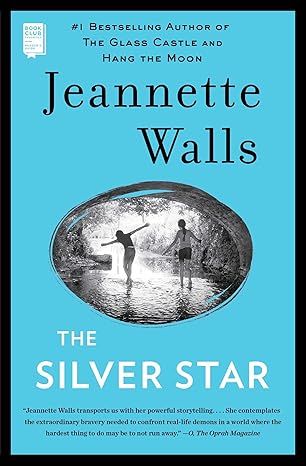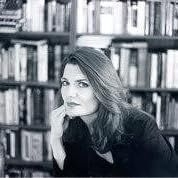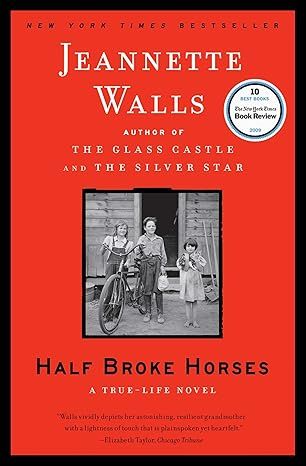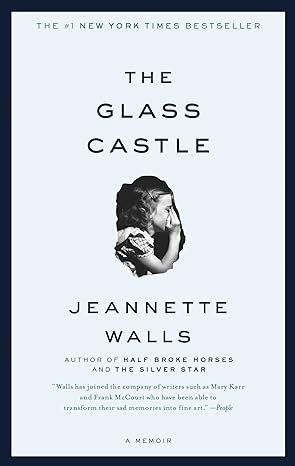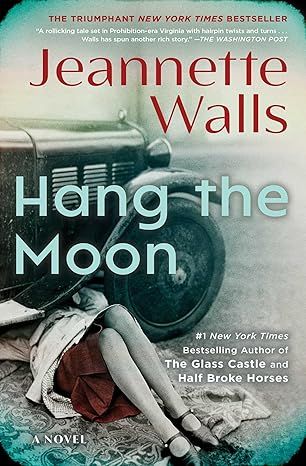The Silver Star: A Novel
4.3
-
8,944 ratings
From the #1 New York Times bestselling author of The Glass Castle and Hang the Moon, Jeannette Walls’s gripping novel "transports us with her powerful storytelling...contemplates the extraordinary bravery needed to confront real-life demons in a world where the hardest thing to do may be to not run away" (O, The Oprah Magazine).
It is 1970 in a small town in California. “Bean” Holladay is twelve and her sister, Liz, is fifteen when their artistic mother, Charlotte, takes off to find herself, leaving her girls enough money to last a month or two. When Bean returns from school one day and sees a police car outside the house, she and Liz decide to take the bus to Virginia, where their widowed Uncle Tinsley lives in the decaying mansion that’s been in Charlotte’s family for generations.
An impetuous optimist, Bean soon discovers who her father was, and hears stories about why their mother left Virginia in the first place. Money is tight, and the sisters start babysitting and doing office work for Jerry Maddox, foreman of the mill in town, who bullies his workers, his tenants, his children, and his wife. Liz is whip-smart—an inventor of word games, reader of Edgar Allan Poe, nonconformist. But when school starts in the fall, it’s Bean who easily adjusts, and Liz who becomes increasingly withdrawn. And then something happens to Liz in the car with Maddox.
Jeannette Walls has written a deeply moving novel about triumph over adversity and about people who find a way to love each other and the world, despite its flaws and injustices.
Kindle
$13.99
Available instantly
Audiobook
$0.99
with membership trial
Hardcover
$1.27
Paperback
$11.63
Ships from
Amazon.com
Payment
Secure transaction
ISBN-10
1451661541
ISBN-13
978-1451661545
Print length
304 pages
Language
English
Publisher
Scribner
Publication date
June 02, 2014
Dimensions
5.25 x 0.6 x 8 inches
Item weight
9 ounces
Popular Highlights in this book
Don’t be afraid of your dark places, Mom told her. If you can shine a light on them, you’ll find treasure there.
Highlighted by 402 Kindle readers
What I do know is that wondering why you survived don’t help you survive.
Highlighted by 295 Kindle readers
No one who dares to be great and reach for the stars worries about being realistic.
Highlighted by 269 Kindle readers
Product details
ASIN :
B00A28HOEA
File size :
1193 KB
Text-to-speech :
Enabled
Screen reader :
Supported
Enhanced typesetting :
Enabled
X-Ray :
Enabled
Word wise :
Enabled
Editorial Reviews
From Booklist
Being a single mother is never easy, but for Charlotte Holladay, a wannabe folk singer in 1970, raising her 15- and 12-year-old daughters, Liz and Jean (aka “Bean”), is more than she can handle. Known for dropping out when things get tough, Charlotte’s latest spell of parental abandonment attracts police attention and the girls flee California rather than face being placed in foster care. A cross-country bus trip lands them on the doorstep of their only relative, the previously unmet Uncle Tinsley, and their arrival proves to be as much of a shock for the reclusive widower as it is for the girls themselves. As the trio learns to coexist, Liz and Bean try to fit into the small southern town. With money tight, they land jobs with mill foreman Jerry Maddox, an overbearing brute who runs roughshod over the town’s residents and takes advantage of Liz’s trusting nature, with devastating results. Readers familiar with Walls’ backstory from her luminous memoir, The Glass Castle (2005), will recognize elements of her personal history in this captivating, read-in-one-sitting, coming-of-age adventure. --Carol Haggas
Review
“At heart Walls is a wonderful yarn-spinner…This is a page-turner, built for hammock or beach reading.” (Karen Valby Entertainment Weekly)
“Walls is adept at steeping her characters in some intense, old-fashioned drama…The Silver Star is a lovely, moving novel with an appealing narrator in Bean.” (Carmela Ciuraru USA Today)
“A remarkable coming of age tale.” (New York Post)
“Walls writes with easy assurance about Liz and Bean, proving in fiction as she did in her memoir, The Glass Castle, that she knows children’s hearts—as well as the evil that can lurk in the hearts of grown-ups.” (Parade)
“Walls writes with the paired-down incisiveness of a memoirist looking for the significance of every incident, but it’s the way she draws Bean, so strong even in the face of all the additional challenges that come with her age, gender, and innocence, that will make this book a hit with readers.” (Nicholas Mancusi The Daily Beast)
Walls has written yet another gripping story of a courageous and sensible girl surviving the adults around her.” (Holly Silva St. Louis Post-Dispatch)
“Told with a balanced, yet whimsical, voice of insight and awareness...[The Silver Star] is set during the Nixon ‘70s and Vietname War, and the author adeptly evokes the tumultuous era in the narrative without letting it overwhelm the primary thread of Bean’s coming-of-age adventures.” (S. Kirk Walsh San Francisco Chronicle)
“Absorbing…” (People)
“A polished work of fiction…Engaging…Fans will find echoes of her coruscating family chronicle that first struck a chord with readers in 2005, but The Silver Star is the novel of a more confident, mature and calculating writer…[an] atmospheric bildungsroman of adolescent passage, changing times and bent but unbroken family bonds.” (Jane Sumner Dallas Morning News)
“Great writing…An absorbing, unsentimental tale of childhood.” (Chelsea Cain The New York Times Book Review)
“A great spirit comes through The Silver Star…Jeannette Walls knows how to make characters pop off the page (and tear your heart out in the process.)” (Angela Mattano Campus Circle Magazine)
“With immense charm and warmth, Walls, the author of The Glass Castle, has created a lively account of kids finding a way to thrive in the absence of reliable parents.” (Real Simple)
“Jeannette Walls transports us with her powerful storytelling…Using Bean’s expertly crafted, naively stubborn voice, Walls contemplates the extraordinary bravery needed to confront real-life demons in a world where the hardest thing to do may be to not run away.” (Abbe Wright O, the Oprah magazine)
“Jeannette Walls is a master at her craft. In the same way she spoke candidly of her own parents’ shortcomings in The Glass Castle, in The Silver Star she lends this candid voice to Bean, and captures the inner workings of an adolescent’s mind perfectly….The Silver Star stands strong as its own story, wholly unique and wholly captivating.” (Kristin Fritz EverdayEbook.com)
“Walls’ writing is lively and her dialogue crips, and the girls’ struggles with their mother ring true.” (Margaret Quamme The Columbus Dispatch)
“[The Silver Star is] an examination of bad parenting and resilient children in a rich and complex setting. Bean is a compelling character, and it is fascinating to watch her ideas about both her mother and her sister change as the book progresses.” (Sarah Rachel Egelman Bookreporter.com)
“Walls writes with equal tenderness for her most beloved characters and the least among them. It takes a compassionate soul to find the beauty in despair and that’s what Walls does best.” (Amy MacKinnon The Patriot Ledger)
“Jeannette Walls jumps off the memoir train and hitches a ride on the novel form with The Silver Star.” (Elissa Schappell Vanity Fair)
“[A] captivating, read-in-one-sitting, coming-of-age adventure.” (Booklist)
“When Bean reads To Kill a Mockingbird in school, she seems like a long-lost cousin to Scout…She makes for a strong and spunky protagonist.” (Publishers Weekly)
“Walls turns what could have been another sentimental girl-on-the-run-finds-home cliché into a fresh consideration of both adolescence and the South on the cusp of major social change.” (Kirkus Reviews (starred review))
“[A] moving book…With relatable characters and a plot that can both rend and heal hearts, The Silver Star is a captivating novel.” (Elizabeth Reid Deseret News)
“Walls weaves a story of triumph and justice.” (Everett Herald)
About the Author
Jeannette Walls graduated from Barnard College and was a journalist in New York. Her memoir, The Glass Castle, has been a New York Times bestseller for more than eight years. She is also the author of the instant New York Times bestsellers The Silver Star and Half Broke Horses, which was named one of the ten best books of 2009 by the editors of The New York Times Book Review. Walls lives in rural Virginia with her husband, the writer John Taylor.
Read more
Sample
Excerpt. © Reprinted by permission. All rights reserved.
CHAPTER FIVE
The birds wokeme early the next morning. I had never heard such noisy birds. I went to the window, and they were everywhere—in the trees right outside, on the ground, swooping in and out of the barn like they owned the place, all the different chirps and tweets and warbling making this incredible commotion.
Liz and I got dressed and walked down to the house. When we knocked on the front door, there was no answer, so we went around to the back. Through a window, we could see Uncle Tinsley moving around inside the kitchen. Liz rapped on the windowpane, and Uncle Tinsley opened the door but blocked it like he had the night before. He had shaved, his wet hair was combed, the part was straight, and instead of his bathrobe, he was wearing gray trousers and a light blue shirt with TMH monogrammed on the pocket.
“How did you girls sleep?” he asked.
“Just fine,” Liz said.
“The birds sure are noisy,” I said.
“I don’t use pesticides, so the birds love it around here,” Uncle Tinsley said.
“Did Mom call, by any chance?” Liz asked.
“Afraid not.”
“She does have the number, right?” I asked.
“This number hasn’t changed since we got it—two, four, six, eight,” he said. “First phone number handed out in Byler, so we got to choose it. Speaking of choosing, how do you like your poached eggs?”
“Hard!” I said.
“Soft,” Liz said.
“Have a seat over there.” He pointed to some rusty cast-iron lawn furniture.
A few minutes later, he came out carrying that same silver tray, loaded up with a stack of toast and three plates that each had a poached egg in the center. The plates had gold curlicues around the rim, but the edges were chipped. I picked up a corner of my egg and scooted a piece of toast under it, then stabbed the yolk with my fork, chopped up the white part of the egg, and mushed it all together.
“Bean always mutilates her food,” Liz told Uncle Tinsley. “It’s disgusting.”
“It tastes better mixed up,” I said. “But that’s not the only reason. First of all, you don’t have to take as many bites, so it saves time. Second, you don’t have to work as hard chewing, because if it’s all mushed up, it’s sort of prechewed. Finally, food gets all mixed up in your stomach anyway, so that’s obviously the way it was meant to be.”
Uncle Tinsley gave a little chuckle and turned to Liz. “Is she always like this?”
“Oh, yeah,” Liz said. “She’s the Beanhead.”
We offered to wash the dishes, but Uncle Tinsley insisted it was easier if he did them himself, without a couple of kids underfoot. He told us to go off and do whatever girls our age did.
Liz and I walked around to the front of the house, where there were two big trees with shiny dark leaves and big white flowers. Beyond them, on the far side of the lawn, was a row of huge green bushes with a gap in the middle. We walked through the gap and found ourselves in an area surrounded by the dark green bushes. A few tough irises pushed up through the weeds in old, overgrown flower beds. In the center was a round brick-edged pond. It was full of dead leaves, but in the water beneath, I saw a flash of brilliant orange.
“Fish!” I yelled. “Goldfish! There’s goldfish in this pond!”
We knelt and studied the orange fish fluttering in and out of the shadows beneath the clumps of dead leaves. I decided this would be a great place for Fido to have a swim. The poor turtle had to be feeling cooped up after all that time in his box.
I ran back to the barn, but when I opened the Tupperware, Fido was floating in the water. He’d seemed fine when I fed him earlier. I set him down on the tabletop, scooting him along with my finger, trying to jump-start him, even though I knew it was hopeless. Fido was dead, and it was all my fault. I had thought I could protect Fido and take care of him, but that bus trip had been too much for the poor little guy. He’d have been better off if I’d left him in Lost Lake.
I put Fido back in the Tupperware dish and carried him out to the pond. Liz put an arm around me and said we needed to ask
Uncle Tinsley where to bury him.
Uncle Tinsley was still puttering in the kitchen when we knocked.
“I thought the two of you were going to go off and play,” he said.
“Fido died,” I said.
Uncle Tinsley glanced at Liz.
“Bean’s turtle,” she said.
“We need to know where to bury him,” I said.
Uncle Tinsley stepped out of the house and closed the door behind him. I handed him the Tupperware dish, and he looked down at Fido. “We bury all the family pets in the family cemetery,” he said. He led us back to the barn, where he picked up a shovel with a long wooden handle, then we all headed up the hill behind it.
“Fido’s a peculiar name for a turtle,” he said as we walked along.
“Bean really wanted a dog,” Liz said, explaining how Mom had told us it was always the kids who wanted the pet but the mother who ended up taking care of it, and she had no interest in walking and cleaning up after a dog. So she’d bought me a turtle.
“Fido means ‘I am faithful,’ ” I said. “Fido was a very faithful turtle.”
“I bet he was,” Uncle Tinsley said.
Beyond the barn were a bunch of dilapidated wooden buildings. Uncle Tinsley pointed out the smokehouse, the milking shed and the foaling shed, the henhouse, the icehouse, and the springhouse, explaining that Mayfield used to be a real working farm, though hands did most of the work. He still had all 205 acres, including a stretch of woods, as well as the big hay field where the cemetery was. These days, a farmer up the road, Mr. Muncie, hayed the field and gave Uncle Tinsley eggs and vegetables in return.
We passed through an orchard, Uncle Tinsley showing us the apple, peach, and cherry trees, and out into a large pasture. At the top of the pasture, a cluster of trees shaded the family cemetery, which was surrounded by a rusting wrought-iron fence. The cemetery was weedy, and a number of the weathered old headstones had toppled over. Uncle Tinsley led us to one well-tended grave with a newish headstone. This was Martha’s, he said, with a vacant spot next to it for him when the time came.
The pets, he explained, were buried around the perimeter, near their owners. “Let’s put Fido near Martha,” Uncle Tinsley said. “I think she would have liked him.”
Uncle Tinsley dug a small hole, and I placed Fido in it, using the Tupperware dish as his coffin. I found a nice piece of white quartz for a headstone. Uncle Tinsley gave a short eulogy. Fido had been a brave and indeed a faithful turtle, he said, who had made the long and perilous journey from California in order to serve as a guardian for his two sister-owners. Once he’d gotten them safely to Virginia, Fido’s job was over, and he felt free to leave them for that secret island in the middle of the ocean that is turtle heaven.
The eulogy made me feel a lot better about both Fido and Uncle Tinsley. On the way back down the hill, I asked about the goldfish we’d found in the pond. “The fish are koi,” Uncle Tinsley said. “That was Mother’s garden. One of the finest private gardens in all of Virginia, back in the day. Mother won prizes for it. She was the envy of every lady in the garden club.”
We swung around the barn and the big white house came into view. I started telling Uncle Tinsley about my house dream and how, when we first arrived at Mayfield, I realized it was the actual house in the dream.
Uncle Tinsley became thoughtful. He rested the shovel against an old water trough in front of the barn. “I guess you’d better see the inside of the house, then,” he said. “Just to make sure.”
We followed Uncle Tinsley up the big porch steps. He took a deep breath and opened the door.
The front hall was large and dark, with a lot of wooden cabinets that had glass doors. Everything was a mess. Newspapers, magazines, books, and mail were stacked high on the tables and the floor, alongside boxes of rocks and bottles filled with dirt and sand and liquids.
“It may look a tad cluttered,” he said, “but that’s because I’m in the middle of reorganizing everything.”
“It’s not so bad,” Liz said. “It just needs a little tidying up.”
“We can help,” I said.
“Oh, no. Everything’s under control. Everything has its place, and I know where everything is.”
Uncle Tinsley showed us the parlor, the dining room, and the ballroom. Oil paintings hung crooked on the walls and a few were falling out of their frames. The Persian carpets were worn and frayed, the silk curtains were faded and torn, and the stained wallpaper was peeling away from the walls. A grand piano covered with a dark green velvet cloth stood in the big ballroom with the French doors. There was all this stuff piled on every available surface— more stacks of paper and notebooks, antique binoculars, pendulum clocks, rolled-up maps, stacks of chipped china, old pistols, ships in bottles, statues of rearing horses, framed photographs, and all these little wooden boxes, one filled with coins, another with buttons, another with old medals. Everything was coated with a thick layer of dust.
“There sure is a ton of stuff in here,” I said.
“Yes, but every single thing you see has value,” Uncle Tinsley said. “If you have the brains to appreciate it.”
He led us up a curving staircase and down a long hall. At the end of the hall, he stopped in front of a pair of doors that faced each other. Both had brass door knockers shaped like birds. “This is the bird wing,” Uncle ...
Read more
About the authors
Jeannette Walls
Jeannette Walls was born in Phoenix, Arizona and grew up in the American Southwest and Welch, West Virginia. She graduated from Barnard College and was a journalist in New York for twenty-five years, writing for New York Magazine, Esquire, and MSNBC. Her memoir, The Glass Castle, has been a New York Times bestseller for more than eight years, has been translated into more than thirty languages and was made into a film starring Brie Larson. She is also the author of the best-selling novels The Silver Star and Half Broke Horses, which was named one of the ten best books of 2009 by the editors of the New York Times Book Review. Her new novel, Hang the Moon, will be published by Scribner in March 2023. Walls lives in central Virginia with her husband, the writer John Taylor.
Read more
Reviews
Customer reviews
4.3 out of 5
8,944 global ratings
Laurel-Rain Snow
5
ABUSE OF POWER, RACIAL TENSIONS, & CULTURE SHOCK
Reviewed in the United States on November 10, 2013
Verified Purchase
In 1970, Charlotte and her two girls, Liz and "Bean," are making it on their own. When Bean was just a baby, they fled the family compound (Mayfield) in Byler, Virginia, where Charlotte grew up as one of the Holladays, the backbone of the community. But the family ties are too tight for Charlotte, who wants a more free and easy existence. She is a star. A musician. With big dreams.
Unfortunately for the girls, Charlotte leaves them often to pursue her dream, sometimes for weeks at a time. But they have discovered how to fend for themselves, cooking chicken potpies for every dinner. At twelve (Bean) and fifteen (Liz), the girls are mature beyond their years in many ways, but naïve in other ways.
But when Charlotte leaves them for a couple of months that turns into more, and they can sense the officials zeroing in on them, they leave a note for their mom in their own special code, and catch a bus to Virginia.
Here is where their lives turn into something more than they had anticipated. Bean learns about her deceased father and meets his family; the girls discover that living in the South is quite different from California; and the culture shock is almost too much.
Read more
Mary C. Napoli
5
the book and story are great, but there are places in the CD's that have glitches
Reviewed in the United States on July 24, 2024
Verified Purchase
I loved the book on CD, but there are places in the CD where it skips part of the story.
linda mckinney
5
Survived and thriving!
Reviewed in the United States on May 26, 2024
Verified Purchase
Excellent writing. Powerful and inspiring characters, very believable. I seek out books written in/ near the Beautiful Appalachian mountains.
Karen Potter
5
Great author
Reviewed in the United States on August 12, 2024
Verified Purchase
Another amazing novel by Jeanette Walls
Delia Gonzalez
5
Loved this book
Reviewed in the United States on June 19, 2024
Verified Purchase
Really great book. I couldn't put it down. Love how the sisters love and protect each other. This author is good. I have read Hang the moon after I read the Silver Star. Walls doesn't disappoint at all.
2 people found this helpful
Best Sellers

The Tuscan Child
4.2
-
100,022
$8.39

The Thursday Murder Club: A Novel (A Thursday Murder Club Mystery)
4.3
-
155,575
$6.33

Sapiens: A Brief History of Humankind
4.6
-
140,302
$13.49

The Butterfly Garden (The Collector, 1)
4.3
-
88,556
$9.59

Things We Hide from the Light (Knockemout Series, 2)
4.4
-
94,890
$11.66

The Last Thing He Told Me: A Novel
4.3
-
154,085
$2.99

The Perfect Marriage: A Completely Gripping Psychological Suspense
4.3
-
143,196
$9.47

The Coworker
4.1
-
80,003
$13.48

First Lie Wins: A Novel (Random House Large Print)
4.3
-
54,062
$14.99

Mile High (Windy City Series Book 1)
4.4
-
59,745
$16.19

Layla
4.2
-
107,613
$8.99

The Locked Door
4.4
-
94,673
$8.53
